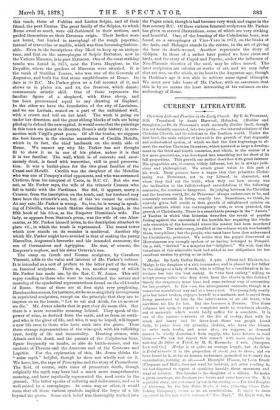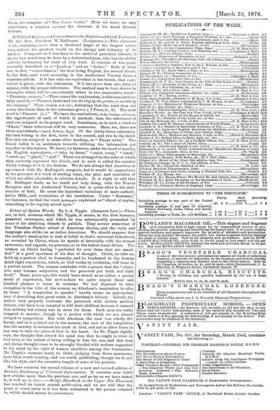Madge. By Lady Dnffus Hardy. 3 vols. (Hurst and Blackett.)—
Madge is the daughter of a rich ironmaeter, and is placed by her father in the charge of a lady of rank, who is willing for a consideration to in- troduce her into the best society. Is " the best society" willing to accept young ladies who drop down from the clouds in this fashion? Surely the chaperone must have had some rational way of accounting for her protegee. In this case, the arrangement succeeds, though in a somewhat roundabout way and at a heavy cost. The young lady nearly gets her heart broken, engages herself to a madman, and is saved from being murdered by him by the intervention of an old lover, who sacrifices his life for her. But she becomes a Peeress. Tho three volumes are spun, to repeat a complaint made to weariness already, out of materials which would fairly suffice for a novelette. It is one of the curious contrasts of the life of to-day; that with its crush and hurry and its fever-heat there are people found daily, to judge from our groaning shelves, who have the leisure to write such hooks, and more also, we suppose, as demand cannot be wholly dissociated from supply, who have leisure to road them.—We can but repeat this remark with more emphasis in noticing As Silver is Tried, by M. E. Kormode. 3 vols. (Sampson Low and Co.) Madge is of quite an average length, but As Silver is Tried exceeds it in the proportion of about _fire to three ; and we have found in it, as far as human endurance permitted us to carry the examination, nothing at all.—A Beautiful Woman, by Loon Brook (Chapman and Hall), does not want for incident, yet after reading it, we feel disposed to repent of speaking harshly about monotony and want of interest. The heroine is the daughter of a villain. To make a great marriage, she deceives two lovers and ruins her own life. It is a painful story, not redeemed by art in the setting.—The Red Knights of Germany, by the late Peter Boyle, 3 vols. (Charing Cross Pub- lishing Company), seems to us an anachronism. It ought to have appeared in the ago which welcomed The Monk." Mr. Boyle was, we
learn, the compiler of " The Court Guido." Here we have, we ma conjecture, a reaction against the decorum of his usual literar labours. Y
5'



































 Previous page
Previous page